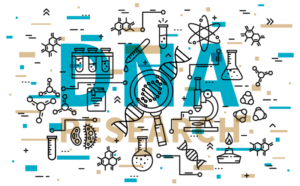Have you ever wondered why nutrition studies show so many conflicting results? Will it be us or will it be our genetic differences?
Most people benefit from a largely unprocessed diet that includes lean protein and lots of fresh vegetables. When it comes to adjusting for performance, weight loss, or optimal health, specific food needs can differ quite a bit for each individual, and much of the “blame” probably lies with genetic variation.
Humans agree 99.5%. The small difference of 0.5% is what makes us unmatched and gives us a unique genetic profile.
Why do we use genetics?
Skin color, body complexion, hair type, and predisposition to specific diseases depend on how genetics interact with the environment. For example, you can be more susceptible, genetically, to suffer from melanoma, so sun protection is recommended to prevent it, reducing the risk. Even the diet that is received from childhood, even during pregnancy, can affect our genetic makeup and alter our development, including diseases that can develop decades later.
Our genes can be influenced by different causes such as:
- Nutrient deficiencies or excesses (especially during development).
- Components of the diet (for example, omega-3 fats, phytoestrogens, cruciferous vegetables, folic acid, carotenoids, etc).
- Sunlight and vitamin D.
- Toxins (such as industrial chemicals, pesticides, heavy metals, etc).
- Bacteria and Viruses.
- Exercise and activity.
- Alcohol and other drugs.
Circadian rhythms (night rest, work shifts, and traveling across time zones). And other factors that we probably don’t know yet.
It may sound scary, and the genetic origin of each one cannot be controlled, but its expression can be controlled, “turning on” or “turning off” the aspects that interest us. How can this genetic regulation be achieved? Controlling the environment in which each individual develops, adjusting the lifestyle to try to prevent certain diseases or achieve optimal health. For example, certain genetic variants inform us of the metabolization of different foods in specific people, or which ones will influence the risk of developing high blood pressure. Some can even predict the inflammatory response and the effectiveness of DNA repair.
Ultimately, knowing “the personal genetic code” will make the right decisions to have the healthiest possible life.
Citing examples, Celiac disease, which is popularly known as gluten intolerance, some patients can ingest certain amounts of this protein without suffering symptoms, due to the genetic difference that defines each person. Therefore, not all celiacs will benefit 100% from the same diet. Even, as something anecdotal, the genetic code can define the tastes for different foods, it is the case of the “soap flavor” of coriander for certain people. The culprit could be a gene called ORGA2 that encodes a type of receptor sensitive to aldehydes, responsible for the taste of this plant.
What can your genetic profile tell you?
Genetic detection provides:
- The effectiveness of lifestyle changes on your health.
- Identification of a rare disease.
- The risks of suffering future diseases such as arrhythmias, cancer, heart failure, Alzheimer’s, aneurysms, diseases of the Central Nervous System (STROKE, TIA, hemorrhages …), Type 2 Diabetes Mellitus, etc.
- The identification of the diseases of which you are a carrier and thus predict the inheritance to your offspring.
- The benefits of personalized sport according to your genetic load.
Processing your new information
Genetic analyzes provide us with useful information that is translated into knowledge and tools to be able to obtain the results to which we aspire. That responsibility, on many occasions, becomes overwhelming and difficult to manage, which is why the support and direction of the nutrition and sports coach is very important.
Genetic screening has allowed us to move closer to the future, and we have made tremendous strides toward individualized nutrition and exercise recipes.
In conclusion:
- Each person is unique and needs an individualized diet, therefore:
- Genetic evaluation is a fundamental tool for monitoring a diet and type of exercise that provides the greatest benefit.
- Eating habits, in turn, are not only based on genomics, but also on the environment that includes tastes, price and culture.
- Genetic expression is not a destination, it is a set of possibilities that can be combined to achieve your goal, which, after all, is ours.
Genomics is complex and challenging, but it is the future we want to develop
Verona Somarriba, Clinical Nutrition Coordinator – Division of General Surgery, Icahn School of Medicine at Mount Sinai (New York)




